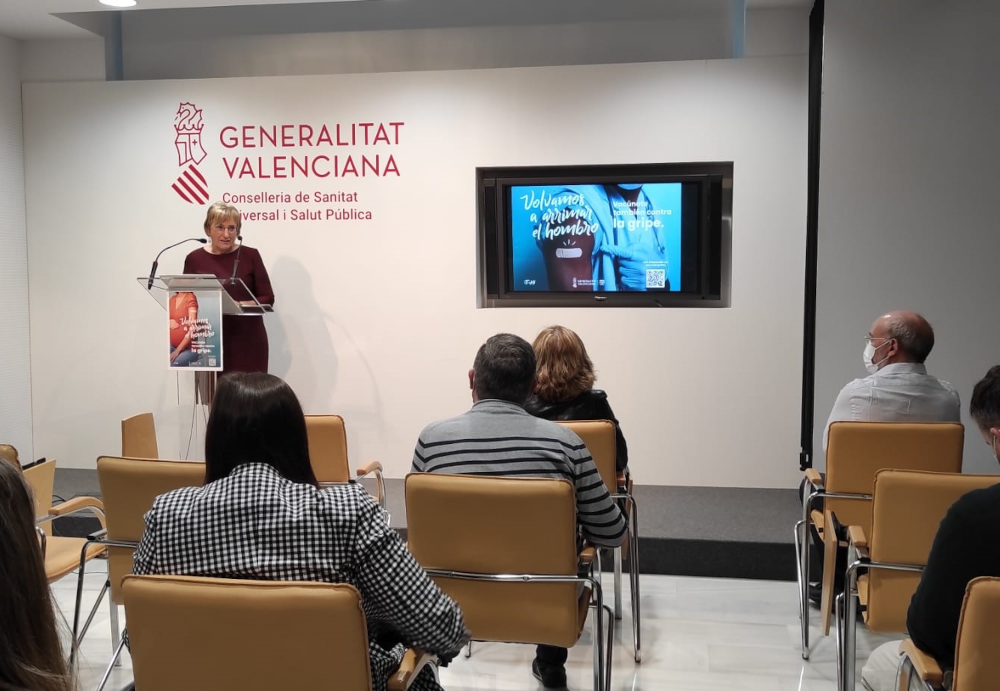Over 700,000 people over the age of 70 will receive flu jab along with booster shot
1,285,000 doses of flu vaccine are allocated this year, 8,900 more than in the previous campaign.

Tuesday 26th October 2021 – PRESS RELEASE with Mike Smith
The regional health ministry in the Comunidad Valenciana will begin vaccinating people in the region over the age of 70 with the COVID-19 vaccine booster shot at the same time as they receive their annual flu jab, of which 1,285,000 doses will be available, almost 9,000 more than last winter.
The vaccination will be carried out in local health centres and by appointment only to avoid the gathering of people which could compromise the safety of patients and health professionals and will be prioritizing the most vulnerable groups.
The regional health secretary, Ana Barceló, explained that “this year we are facing a special campaign that will simultaneously administer the flu vaccine with booster doses of the COVID-19 vaccine … the experience gained during the months of coronavirus vaccination will help us tackle this campaign with the goal of continuing to protect and care for the people who are at greatest risk“.
The four groups to which the flu vaccine will be administered are: people over 65, people who are at risk of complications from flu (such as pregnant women or those who have just given birth), social and health personnel, and essential public service personnel.
Barceló explained that “it is expected that the first to be immunized will be people over the age of 70, about 700,000 in the Comunidad Valenciana, who will receive the flu vaccine along with a booster dose against COVID-19“. This booster dose will be mRNA (Pfizer and Moderna vaccines) and will be administered along with the flu vaccine, preferably one in each arm, at the local health centres. In order to receive this third dose, at least six months must have passed since the second dose was administered.
During this first phase, pregnant women will be vaccinated as well as residents and staff of the centres of the elderly and those with functional diversity, and health professionals. The goal is for these groups to be vaccinated in the first two weeks of the campaign.
Once the groups have been completed, vaccination of the other risk groups will begin: people aged between 65 and 69, and at risk people aged 64, and essential service staff.
Appointments can be requested by calling your local health centre or through the GVA+ Sanidad APP, although appointments for the flu vaccine will only be available to those people who belong to one of the risk groups.
The objective is to reach 75% coverage for people over the age of 65 along with health and social personnel, 70% for pregnant women and 60% for those groups who are at risk of disease.
The slogan chosen for this year’s flu vaccination campaign is “Volvamos a arrimar el hombro” – “Let’s shrug our shoulders” – which, as Barceló explains, calls upon the population to continue to contribute to the region’s fight against COVID-19, “to continue to make the effort to protect ourselves and also those around us“.
Influenzea is not a particular risk for people without underlying conditions, but it can cause complications for people with previous illnesses and pregnant women, and those who do get vaccinated are at a lower risk of developing those complications. The flu vaccine has proven to be safe and effective for many years.
Importance of the vaccine to deal with coronavirus
The regional health secretary stressed that “the pandemic is not over” and appealed for continued social responsibility to continue the fight against the coronavirus.
She explained that “10% of the population remain unvaccinated” and she wanted to stress the importance of protecting against the virus. “We continue to make available all the facilities with mobile vaccination points at universities, concerts, and other events.“
Influenza vaccine and coronavirus
According to the latest scientific studies, the administration of the flu vaccine is safe for people who have recovered from or are suffering from a mild or asymptomatic COVID-19 and can receive the jab once the recommendation isolation period is over.
For those patients who have been hospitalized with COVID-19, healthcare professionals will establish the appropriate time to administer the flu vaccine, taking into account their clinical condition.
Finally, those close contacts of a confirmed case who belong to the groups for which the flu vaccine is recommended can be vaccinated once they have completed the quarantine period without having developed any symptoms of COVID-19.



